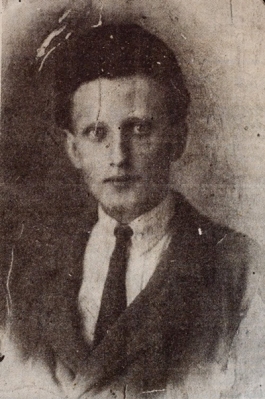The venerable Prague-based literary journal B O D Y has published my translation of “The Tram,” a sprightly poem by Yuri Kazarnovsky, a victim of oppression whose spirit, despite all odds, remained unbroken — at least in verse. Introducing the poem, I write:
The Russian poet Yuri Kazarnovsky (1905 – ca. 1960) was born in Rostov-on-Don. In 1927 he was arrested, along with 11 other students, for participating in a subversive literary circle; he spent four years in the Solovki prison camp (1928 – 1931), where he contributed poems to the camp’s literary journal, and another year working on the construction of the White Sea-Baltic Canal. He was released in 1932 and published one collection of poems in 1936, but was arrested again in 1937. Kazarnovsky may have been one of the last people to see Osip Mandelstam alive; the poets were housed in the same barracks at a transit camp near Vladivostok. After serving another four years in Kolyma (1938 – 1942), he was sent to work as a health inspector at the camps in Mariinsk, Siberia. Two years later he moved to Tashkent, where he descended into drug addiction. He was presumed to have died around 1956, but it was recently established that he lived at least another four years in Moscow, in abject poverty, and exchanged a number of letters with one of the major Soviet poets, Ilya Selvinsky (1899 – 1968). “The Tram” is drawn from Kazarnovsky’s 1936 collection. It reverberates with wit and the joy of invention. The poem’s lightness and brightness seem so incongruous with the cruel facts of Kazarnovsky’s life, but might in fact explain how he managed to withstand those facts.

August 1929
You can learn a bit more about Kazarnovsky at the fascinating virtual exhibit Beauty in Hell: Culture in the Gulag, curated by Dr. Andrea Gullotta of the University of Glasgow. And here is “The Tram” in Russian:
Трамвай
Он везёт
одиннадцать свиданий,
Две разлуки,
сумочку в руке,
Семь портфелей,
восемь опозданий,
И жука
на чьем-то пиджаке.
Он спешит.
И множит громыханье,
Режет вечер,
молод и жесток.
Он звонит —
и тотчас расстоянье
Без оглядки
мчится на звонок.
Он везёт
закутанное пенье,
В серых брюках
едущий доклад.
Пьяный нос
(в обратном направлении),
Женских глаз
лукавый виноград.
Он везёт
намотанное время
Всех часов —
карманных и ручных,
Он спешит
в гудящей теореме
Доказать
величие прямых.
Наступили
летчику на ногу,
Как обидно
другу облаков.
Пролагая
торную дорогу,
Прётся танком
шар семи пудов.
А трамвай
быстрее режет вечер.
Хорошо
и мчаться и звенеть, —
И углы,
и улицы навстречу
Подбегают
ближе посмотреть.
Он везёт
толстовку на собранье,
Двух влюбленных —
в марево луны.
Мне влезает
на ноги, как зданье,
Существо
трехспальной ширины.
За подножку
уцепилось лето
И роняет
звезды от толчков…
— Дайте мне, кондуктор,
два билета:
Для меня
и для моих стихов.
1932
What a delightful poem, and what a fine job you’ve done with it! “It carries in it/ a smock to a convention// and two lovers/ to a moony haze” made me laugh with pleasure.
LikeLiked by 1 person
Many thanks, LH! It’s one of my favorite quatrains… I can’t help but imagine Carole Lombard and Clark Gable, or Claudette Colbert and, well, Clark Gable staring out at the moon…
LikeLike
[…] little over a month ago I shared a link to my translation of Yuri Kazarnovsky’s rollicking poem “The Tram,” which inspired an […]
LikeLike
[…] little over a month ago I shared a link to my translation of Yuri Kazarnovsky’s rollicking poem “The Tram,” which inspired an […]
LikeLike